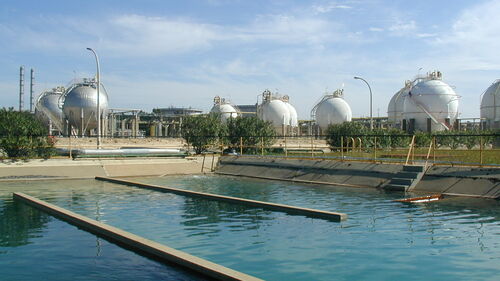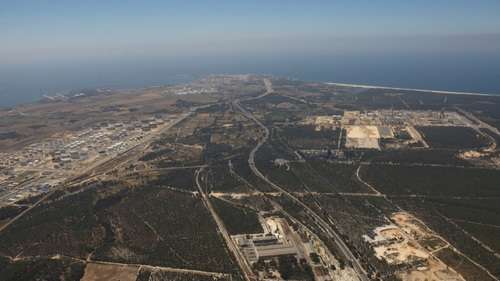Repsol to expand its industrial complex in Sines, Portugal to make it one of the most advanced in Europe
Repsol will build two polymer materials plants at its Sines Industrial Complex (Portugal), representing the largest industrial investment in Portugal in the last ten years, at €657 million. The new materials produced are 100% recyclable, like the rest of Repsol's polyolefins, and can be used for highly specialized applications aligned with energy transition in the pharmaceutical, automotive and food industries. The facilities will be operational in 2025 and make the Sines Industrial Complex one of the most advanced in Europe due to its flexibility, high degree of integration and competitiveness.
The project includes a linear polyethylene (PEL) plant and a polypropylene (PP) plant, each with a capacity of 300,000 tons per year. The technologies applied in both plants, which guarantee maximum energy efficiency, are market leaders and the first of their kind to be installed on the Iberian Peninsula.
Located in a privileged location, the Sines Industrial Complex will also have new logistics facilities, incorporating the possibility of using rail transport. This will improve the connection with the European market and reduce the carbon footprint of product transportation.
This investment in the Sines Industrial Complex will increase the synergies of the company's industrial business which already operates with a high degree of logistic and comercial integration and a highly efficient and flexible joint operation. It also contributes to Repsol's goal of having a more integrated and diversified petrochemical industry, with higher value-added products.
Repsol's Industrial Complex in Tarragona is the largest petrochemical hub in Spain and, among the many types of polymers produced there, the range of highly specialized products for the automotive sector, such as high impact-resistance polymers, stands out. The Puertollano Industrial Complex, also a benchmark in the production of materials of circular origin, has recently announced the construction of a new polyurethane recycling plant, and the A Coruña Industrial Complex began operations at a new polymer-grade propylene unit last April.
The new investment project has been designed to accompany Repsol's goals of being a net zero emissions company by 2050 and is aligned with the Paris Agreement. The Portuguese government has considered this investment of National Interest and has granted tax incentives worth up to €63 million.
According to Josu Jon Imaz, Repsol’s CEO, "this investment demonstrates Repsol's commitment to its industrial complex in Portugal. The company is supporting industrial development that enables the energy transition while creating wealth and quality employment."
Investments in these projects demonstrate how decarbonization approached from a technology-neutral perspective will guarantee the future and profitability of Repsol's Industrial Complex in Sines, securing its current workforce while creating new jobs and promoting wealth in the country.
During the construction phase, an average of 550 direct and indirect jobs are expected to be generated, with a peak of more than 1,000 people. Once in operation, the net increase in personnel will be approximately 75 direct jobs and about 300 indirect jobs. All of these will be highly qualified personnel, demonstrating Repsol's commitment to attracting and retaining talent, as well as generating high quality employment.
An industrial business in transformation
The 2021-2025 Strategic Plan envisages a total investment of €18.3 billion between 2021 and 2025 and include numerous projects to evolve its industrial area, which is already highly competitive, holding leading position in Europe. This business is of great importance in the creation of employment, competitiveness and wealth, and will be able to continue providing society with the goods it needs, with a low, zero or even negative carbon footprint.
Repsol is already transforming all its industrial complexes into multi-energy hubs, equipping them with the latest technologies that enable them to decarbonize their processes by improving energy efficiency, promoting the circular economy, producing renewable hydrogen and increasing the use and capture of CO2.
Repsol manufactures and markets a wide variety of petrochemical products, ranging from basic petrochemicals to derivatives, including a wide range of polyolefins with a high degree of differentiation, all of which are 100% recyclable. The company is committed to an efficient chemicals business with products with a lower carbon footprint and geared towards circular economy, and its goals include recycling the equivalent of 20% of its polyolefin production by 2030.
Petrochemical products, which are very present in everyday life, play a leading role in a less carbon-intensive future. They also improve energy efficiency thanks to their properties, including a reduction in the weight of materials that contribute to lower energy consumption in mobility and improved insulation of homes and buildings.
Categories
Investments
2021-01-01
€ 657 mln at ZILS - Sines Industrial and Logistics Zone (PT)Companies
Latest news
Ports of Duisburg and Rotterdam advance energy transition together
Port of Rotterdam →With this LoI, the two major European logistics hubs reinforce their goal of jointly developing sustainable transport corridors via waterways as well as future-oriented initiatives for the energy t...
BASF constructs new electronic grade ammonium hydroxide plant in Ludwigshafen
BASF SE, Ludwigshafen →State-of-the-art facility to support the development of the advanced European semiconductor industry. New capacity meets growing demand for the manufacturing of chips in Europe
SynPet Technologies to bring emerging technology in plastics recycling to the Port of Antwerp-Bruges
Port Of Antwerp →SynPet Technologies is investing €300 million in an innovative facility that converts all types of plastics into a circular naphtha substitute without pre-treatment and with efficient conversion ra...
NEXTCHEM awarded a feasibility study by Mana Group and Equinor for the production of sustainable fuels in Norway leveraging its NX Circular™ technology
With the support of NEXTCHEM, Mana (NG Nordic) and Equinor are entering an early-stage strategic partnership to explore the potential development of the Nordics' first large-scale waste-to-methanol...


